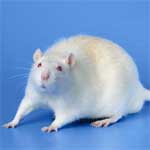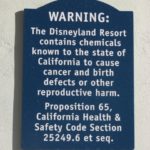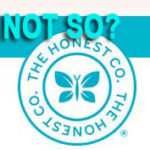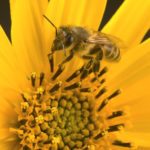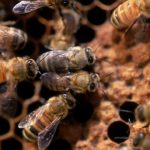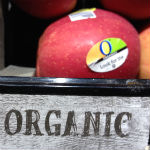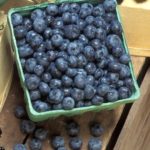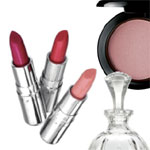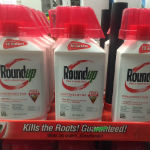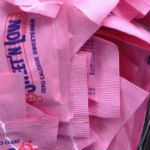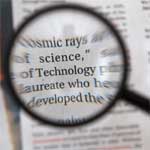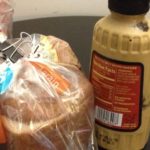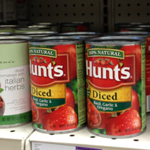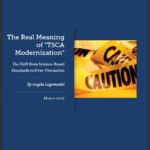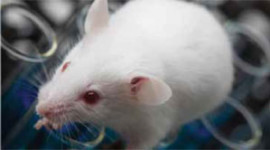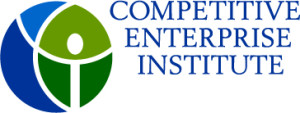"Dr. Oz Audience Down 50 Percent – So We’re Halfway There," by Ana-Marija Dolaskie. Healthcare experts across the nation are weeping in unison over the return of the Dr. Mehmet Oz Show, because it’s beginning its seventh season Monday and neither facts nor ethics can stop it. The news is not all bad, though. To say his show and reputation have taken a hit, thanks to the American Council on Science and Health spearheading a nationally publicized effort to get him removed from the faculty at … [Read more...]
Guerrilla War Against Chemicals Hits Starbucks
"The Guerrilla War Against Chemicals Extends To Starbucks," Pepsi, By Dr. Robert Lichter. The latest skirmish in the war of anti-chemical crusaders against the food industry broke out in an unlikely place – the usually tranquil waters of Starbucks’ pumpkin spice latte. Vani Hari, author of the widely read Food Babe blog, recently kicked up a fuss by charging that the popular drink contains a cancer-causing substance called 4-mei, which is a byproduct of its caramel coloring. As the name of her … [Read more...]
Difference between Health threats and Health Scares
"Health Scares At The Drop Of A Rat," By American Council on Science and Health. Beginning in 1976 with a book entitled Panic In The Pantry, the team of scholars that went on to found the American Council on Science and Health and to form its first trustees and Scientific Advisory Panel, have been clarifying, as the Wall Street Journal called our mission, the difference between a health threat and a health scare. By the mid-1970s, promoting fear and doubt about food and chemicals and the … [Read more...]
Chemophobia and the Precautionary Principle
"Prescribing Caution with Precautionary Principle," By Gil Ross. Not long ago, Tracey Brown, managing director Sense About Science , a British advocacy group that shares many interests with us here at the American Council, wrote an essay in The Guardian entitled “The Precautionary Principle is a blunt instrument.” To many in the chemophobic, anti-technology camp, the precautionary principle (PP) is akin to the 11th Commandment: Thou shalt make no scientific or industrial progress without first … [Read more...]
Prop 65: Lawyers’ Pilfering of Small Businesses
"Prop. 65 a Burden on Small Businesses, Bonanza for Lawyers," By Jospeh Perrone. California’s chemical labeling law, Proposition 65, has long been criticized for costing businesses millions in frivolous lawsuits without doing much to improve public health. Gov. Jerry Brown signed modest reforms into the law in 2013. But instead of helping curb these out-of-control lawsuits, newly released figures show the amount of money paid by businesses last year to settle Prop. 65 lawsuits actually … [Read more...]
Not So Honest Company?
"Jessica Alba’s Company Sued for Being Not-So-‘Honest.’" by Center for Accountability in Science. A few weeks ago, we highlighted the problems with sunscreen sold by Jessica Alba’s Honest Company—despite being “all natural,” many consumers reported it didn’t actually stop them from getting sunburned. Now, the Honest Company is being sued for its ineffective products and misleading marketing. The company is currently fighting two lawsuits. Read more. … [Read more...]
Reducing Food Waste with BPA
"Reducing Food Waste in Europe – BPA’s Contribution," by BPA Coalition. According to a new study carried out by scientists from the European Commission’s Joint Research Centre, Europeans waste an average of 123 kg of food per capita annually, or 16% of all food reaching consumers. In total, this would mean 47 million tons of food waste annually. Though there are many ways to better preserve and utilise food, packaging and canning food is one principle methods. Effective canning requires the use … [Read more...]
Myth about Honeybees’ Impact on Food Supply
"Pollinator myth: Are bees responsible for one third of global food, heightening crisis? More like 7%" by Genetic Literacy Project. Will the planet starve if bees disappear? Aren’t bees responsible for a significant chunk of the world’s food supply and nutrition, from one third to as much as 90 percent, depending on what advocacy group is making the claim? You hear such assertions invoked by advocacy groups, reported as truth by journalists and cited by politicians as accepted wisdom whenever … [Read more...]
Market Demand Ensures Honeybee Survival
"How Markets Benefit Honeybees and Mankind," By Angela Logomasini, Ph.D. After more than a decade of panicked reports about honeybees disappearing and potentially going extinct because of a phenomenon called “colony collapse disorder,” The Washington Post reported last week that the number of hives in the United States has reached a 20 year high. At the same time, I was making presentation at a meeting of the American Legislative Exchange Council, explaining that globally, there are more … [Read more...]
Organic Food Hoax
"The Colossal Hoax Of Organic Agriculture," By Henry I. Miller and Drew L. Kershen. Consumers of organic foods are getting both more and less than they bargained for. On both counts, it’s not good. Many people who pay the huge premium—often more than a hundred percent–for organic foods do so because they’re afraid of pesticides. If that’s their rationale, they misunderstand the nuances of organic agriculture. Although it’s true that synthetic chemical pesticides are generally prohibited, there … [Read more...]
“Natural” Food is Made of Chemicals
"'All Natural' Doesn't Make Food Safer, Healthier," By Dr. Joseph Perrone. Would you feed your kids a snack that includes ethyl ethanoate, 3-methylbutyraldehyde, butylated hydroxytoluene and linoleic acid? While many Americans would probably balk at loading up lunchboxes with these scary sounding chemicals, they're actually common compounds found in blueberries. Listing off hard-to-pronounce chemicals as a reason to avoid certain foods has been the basis of campaigns by activists such as the … [Read more...]
Paltrow Uses Junk Science to Sell Her Cosmetics
"Gwyneth Paltrow Whips Up Consumer Fears to Promote New Organic Cosmetics Line," by Center for Accountability in Science. Gwyneth Paltrow isn’t exactly known for giving the best health advice. She advocates “detoxing” by severe diet restrictions, saunas, and colonics to “flush out” toxins—treatments that are at best useless (as Frank Sacks, MD, of the Harvard School of Public Health says, the idea that you need to help your body get rid of toxins has “no basis in human biology”) and at worst … [Read more...]
Rounding Up the Facts about Pesticides in Breast Milk
"Science Trumps Hysteria When it Comes to Breast Milk and Pesticides," by American Council on Science and Health. The scientific literature has established that, when possible, breast milk offers terrific advantages to children, so it was the perfect way for anti-science groups to promote fear and doubt about a commonly used pesticide called glyphosate, which has been used by home gardeners for decades under the name Roundup. Though the U.S. Environmental Protection Agency has never found … [Read more...]
Aspartame Phase Out Unwarranted
"Pepsi Exchanges one Artificial Chemical Sweetener for Another Artificial Chemical Sweetener," By American Council on Science and Health. In just a few days, Diet Pepsi will no longer contain the artificial sweetener aspartame. PepsiCo is replacing aspartame in Diet Pepsi, Caffeine Free Diet Pepsi, and Wild Cherry Diet Pepsi with another artificial sweetener, sucralose (commonly known as Splenda), which is used in Coke Zero. The move follows consumer backlash against aspartame, and has … [Read more...]
Unscientific Cancer Classifications
"The UN’s Relentless March Of Unreason," By Henry Miller. Since the 16th century, the guiding principle of the science of toxicology has been that “the dose makes the poison.” In other words, toxicology tells us what quantity (dose) of a substance will cause harm. This applies to the medicines used by Americans hundreds of millions of times a day to help relieve symptoms or treat illnesses’ for example, the right dose of aspirin or an over-the-counter cold remedy can be a therapeutic godsend, … [Read more...]
Beepocalypse Narrative Doesn’t Pass Test
"Attempt to Breath New Life into Beepocalypse Narrative Doesn’t Pass Laugh Test, "by Genetic Literacy Project. It doesn’t take a peer-reviewed study to tell you that if you blot out the sun, plants won’t grow and solar panels are going to stop functioning. Or if a mammoth asteroid unexpectedly hit the earth tomorrow, it would cause enormous destruction. Or if… you get the point. Doomsday scenarios are great as sci-fi pulp or to bolster ideological campaigns, but such musings offer no practical … [Read more...]
“BPA-Free” Cans No Safer than Alternatives
"Green Advice On Canned Foods Belongs In The Trash," By Angela Logomasini, Ph.D. Go to the supermarket and you may notice canned food bearing the label “BPA-free.” It doesn’t mean those products are any better than others—although they may be more expensive. Environmental activists spawned the nonsensical demand for Bisphenol A-free packaging by focusing on spin rather than science. The latest example is the Environmental Working Group’s (EWG) report, “BPA in Canned Food: Behind the Brand … [Read more...]
Bisphenol F in Mustard — But Don’t Worry
"Bisphenol F in Mustard? No Problem!" by SaferFruitsandVeggies.com. Here’s a fact you most certainly didn’t know: Bisphenol F, another substance in the “bisphenol” group, is naturally formed in mustard, and humans have been ingesting it for a long time with little consequence. BPF, like BPA, is an endocrine active substance. Interestingly, according to a recent study from the Swiss Food Safety Administration (BLV), the average person takes in about three times more BPF from mustard consumption … [Read more...]
Roundup Junk Science
"If You’re Going to Pick Your Poison, at Least Choose the Right One," by American Council on Science and Health. The winner in this month’s “I need a chemistry lesson, and fast” award goes to Anthony Dunton of Acworth, Georgia. Hands down. Dunton was arrested last week for trying to poison a co-worker by putting the weed killer Roundup (glyphosate) into his water. Let’s just give him mixed grades on this one. Dunton denied trying to kill the man, but, rather, just “mess with him.” In this … [Read more...]
Kudos to McClintock
"Kudos to Rep. Tom McClintock for His Principled Stand," by Angela Logomasini, Ph.D. Last night, the U.S. House of Representatives passed its version of TSCA reform (H.R. 2576) by a roll call vote of 398 in favor, one opposed, and 34 members not voting. Yesterday, I lamented the fact that this bill was pushed through under suspension of the rules, which is supposed to be for low-cost, non-controversial bills, which is something that TSCA reform certainly is not. In any case, the issue is very … [Read more...]
Activists Threaten Nutrition for Expecting Moms
"Environmental Activists Threaten Nutrition for Pregnant Women," by Center for Accountability in Science. This week activists with the Environmental Working Group and Mercury Policy Project again slammed draft recommendations from the U.S. Food and Drug Administration urging pregnant women and children eat more fish—a valuable source of protein and many heart- and brain-healthy nutrients. The FDA is far from the only agency that believes the health benefits of fish should surpass concerns over … [Read more...]
Josh Bloom Takes on Environmental Working Group Junk Science
"Dr. Josh Bloom on Science 2.0: EWG’s Little Site Of Horrors," by American Council on Science and Health. Josh primary 10-13We have to wonder if Environmental Working Group is having a really bad fiscal quarter because their website has become littered with even more anti-science, scary chemical verbiage than usual. It’s clear they know what their donors think about actual science and evidence, since now they are going after the U.S. Food & Drug Administration for its “generally recognized … [Read more...]
EWG Junk Science
"Junk Science Comes Back and Bites the Environmental Working Group in the Can," by American Council on Science and Health. If there is a better example of what happens when junk science meets reality, good luck finding it. Look no further than today’s New York Times article about how a misguided attempt to solve a non-problem turned into a real problem. ACSH’s Dr. Josh Bloom says, “Let’s give (negative) credit to the ‘anti-BPA cottage industry.’ They have succeeded beyond their wildest dreams … [Read more...]
Chemophobia Exposé
"Headline: Can Your Bathmat Cause Cancer? Hey — Don’t Worry About It!" By American Council on Science and Health. In fact, this excellent essay doesn’t even mention bathmats — but it may have to, when the next version comes out. We tried not to mention the entire headline — really, we did — but in the end, we caved, so here it is: Why You Shouldn’t Care That Yogurt, Mouthwash, Red Meat, Burnt Toast, and Bras Have Been Linked to Cancer. This exposé by (Steven) Ross Pomeroy appeared in the Newton … [Read more...]
TSCA Bill Reaches House Floor
"Suspending Reason to Pass 'TSCA Reform'" by Angela Logomasini The process of lawmaking is often compared to sausage making: an unpalatable job that produces a palatable result. It’s easy to agree with the first part of that analogy, but in politics, the result isn’t always pleasant. Today, U.S. House of Representatives is scheduled to “suspend the rules” and pass its version of reform to the Toxic Substances Control Act (TSCA). This cursory approach is another example of the suspension of … [Read more...]


